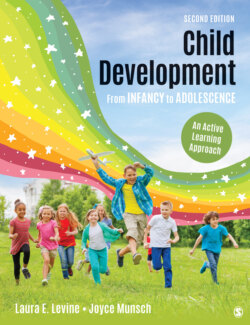Читать книгу Child Development From Infancy to Adolescence - Laura E. Levine - Страница 190
На сайте Литреса книга снята с продажи.
Behavioral Genetics
Оглавление>> LQ 3.4 How do researchers study the relationship between genetic inheritance and individual traits and behavior?
With some understanding of how genes function, we now look at the question of how children’s behavior and development are related to the genes they inherit. Whereas molecular genetics begins with identification of genes and examines how they are related to outcomes such as human behavior, disease, and other characteristics, behavioral genetics begins at the level of traits and behaviors and uses several techniques to try to determine how heritable these characteristics are. If high levels of heritability are found, indicating a significant role of genes, researchers can then look for the particular genes that are involved. With the development of genome-wide association tests, described earlier as a way to look at the whole human genome, researchers can now look widely at which genes may be related to human characteristics. We should keep in mind that genetic inheritance of behavior and traits may involve not just a specific gene, but also the interaction of that gene with other genes and with the environment, so results taken from behavioral genetics and molecular genetics may indicate different levels of heritability (Thapar & Harold, 2014).
Heritability: A measure of the extent to which genes determine a particular behavior or characteristic.
Historically researchers have used several approaches to try to separate the relative influence of genes and environment on the expression of that behavior. You might think that simply noting how similar children are to their parents could tell us whether a behavior is determined by genetics, but genetic influences and environmental setting are often intertwined in complex ways. For example, imagine walking into the home of a new friend and discovering this friend is a very talented pianist. You then find out both parents in this family perform with a local choir and their youngest child is a gifted violinist. What would you conclude about the source of this musical talent? Did the children in this family inherit genes for their musical ability, or did they learn about music from the experiences their parents provided for them? In this situation, there is no way to know which has happened. It’s likely both genes and environment have had an influence, but scientifically it is impossible to sort out which factor had what effect.
TRUE/FALSE VIDEO
T/F #7
Mike is a talented pianist. Because both of his parents are musicians, genes must have determined that Mike would also have musical talent. False
In theory we might solve this problem by taking children from musical families and placing them in families that are not musical to see what happens. If musical ability is produced by genes, these children will still develop this talent. If it is produced by environmental influences, they will not necessarily be musical after growing up in a nonmusical family. Obviously it is unethical to do anything like this with human beings, so psychologists have had to look for natural situations that might provide the same information. We describe three types of studies that take advantage of such natural situations: (1) studies of adopted children, (2) comparisons of identical and fraternal twins, and (3) studies of identical twins adopted in infancy and reared apart by different families. Then we examine research that has used genome-wide association tests to locate genes associated with personality characteristics.
